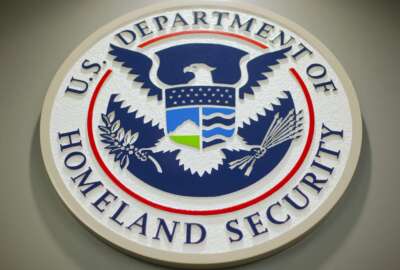Congressmen raise concerns about child care during government shutdown
In today's Federal Newscast: Two congressmen are raising concerns about child care for essential workers during a government shutdown. D.C. Delegate Eleanor Holmes...
- As agencies brace for a possible government shutdown, a couple lawmakers are raising concerns about feds who would continue to work. Reps. Gerry Connolly (D-Va.) and Derek Kilmer (D-Wash.) said continued access to federal child care centers is critical for frontline employees during a shutdown. They said the workers should not have to choose between continuing to work, and meeting the needs of their families. The lawmakers are calling on the Biden administration to work with agencies and ensure the continuity of federal child care options in the case of a shutdown. (Letter to OMB Director Shalanda Young - Reps. Gerry Connolly (D-Va.) and Derek Kilmer (D-Wash.))
- Enrollees in the Federal Long Term Care Insurance Program (FLTCIP) are in for a steep premium hike. The exact premium increases are a little different for everyone in the program, but at least a handful of enrollees will see an 86% jump in their premiums by 2026. The Office of Personnel Management declined to share an average, saying the rates are too variable. And to try to offset the effects, OPM is implementing the increase over the course of three years. Enrollees also have the option of reducing their benefits to keep their premiums lower. The National Active and Retired Federal Employees Association (NARFE) called the scenario a "bait-and-switch," where enrollees either have to move to a higher cost product or lose their investment.(Federal long term care insurance premiums to increase by as much as 86%, data shows - Federal News Network)
- The Department of Homeland Security has some suggestions for how to streamline a growing patchwork of cyber regulations. There are 45 requirements used by more than 20 federal agencies to require companies and other organizations to disclose cyber incidents. The Department of Homeland Security is urging agencies to harmonize all those rules. DHS is proposing a common definition for what kind of incidents organizations should report. And the department has also developed a standard form agencies can use to make telling the government about a damaging hack a whole lot easier. (DHS says agencies should adopt cyber incident reporting definition, common form - Federal News Network)
- Legislation introduced in the House this week would keep the District of Columbia’s court system up and running, if the federal government shuts down at the end of this month. The D.C. judicial system is unique. Even though it is a local government function, it is funded mostly with federal dollars. Keeping the courts running takes a separate act of Congress each time there is a shutdown. The bill was introduced yesterday by Del. Eleanor Holmes Norton (D-D.C.), who said the district's courts are a “bystander” that should not be caught up in federal appropriations fights. (Norton introduces bill to exempt D.C. courts from federal government shutdowns - Office of Del. Eleanor Holmes Norton (D-D.C.))
- The Postal Service is cutting labor costs this holiday season and passing the savings onto its customers. USPS said its customers will not pay a surcharge to mail packages during its peak season. That is a change from recent years, when it added the fee to cover for increased labor costs. But USPS plans to save money by hiring only 10,000 seasonal employees, which is half as many as it brought on last year. Joshua Colin is USPS’ chief retail and delivery officer. He said the agency will not have to spend so much on temporary workers, because it has been building up its career workforce over the past few years. “Our continued focus is on retaining the employees that sign up and come on board,” Colin said.(USPS ends peak holiday surcharge as it cuts year-end demand for temporary hires - Federal News Network)
- The House and Senate are about to start ironing out their differences over the annual defense authorization bill. The House voted 393 to 27 yesterday, to send its version of the NDAA to a conference committee. House Speaker Kevin McCarthy (R-Calif.) named 21 members, all Republicans, to represent the House’s views on the conference committee. House Democrats oppose their chamber’s version of the bill, but they’ are hopeful the provisions they dislike will be softened or removed once negotiations start with the Democratic-controlled Senate.(House appoints members to 2024 NDAA conference committee - House Armed Services Committee)
- Here is another bad sign for the prospect of keeping the government open past the end of this month. Yesterday afternoon, the House voted against moving forward with its own Defense appropriations bill. Traditionally, that part of the federal appropriations package gets approval from a bipartisan majority even when there is disagreement about overall spending levels. Democrats voted unanimously against the bill, and five Republicans voted no, saying they want assurances from House Speaker Kevin McCarthy (R-Calif.) about an overall funding plan that would cut federal spending.
- A federal agency is inviting critical technology manufacturers and users to see whether their equipment can withstand GPS disruption and spoofing. The Department of Homeland Security’s Science and Technology Directorate will host the event next fall, called, "GPS Testing for Critical Infrastructure." GPS spoofing and jamming tests are typically limited to laboratory environments, but DHS said its event will feature the rare opportunity to do what’s called “live-sky” tests. Applications are due to DHS S-and-T by Oct. 20.
- A decade-long experiment to make better use of federal real estate is finally done. The Transportation Department opened its doors to the new John Volpe National Transportation Systems Center in Boston. It got some help from the federal government’s landlord, the General Services Administration, which in 2012, reached a deal with MIT. The university agreed to build the new Volpe Center in exchange for letting it redevelop the rest of the 14-acre federal research campus. GSA made the deal with MIT to make better use of underutilized federal property.
Copyright © 2025 Federal News Network. All rights reserved. This website is not intended for users located within the European Economic Area.
Peter Musurlian
Peter Musurlian is a producer at Federal News Network.
Follow @PMusurlianWFED






